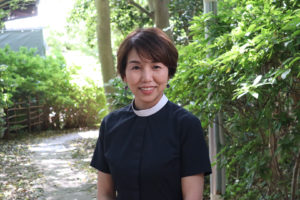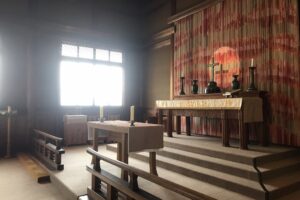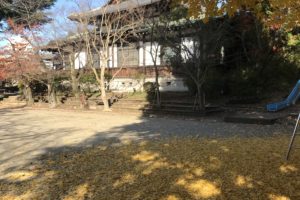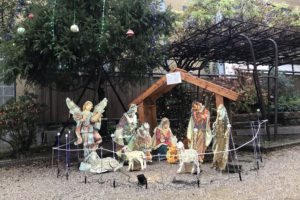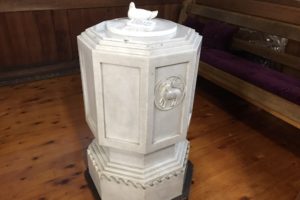5 Epiphany, Year B, February 4, 2024
Mark 1:29-39
Rev. Misa Furumoto
Last weekend, I visited Taiwan. It was a trip organized by the overseas relation department I am in charge of, under the Kyoto Diocese, to visit the Episcopal Church in Taiwan. Apart from myself, there were five others who joined from our church. It was a short trip of two nights and three days, but on Sunday, we attended the Eucharist at the Church of the Good Shepherd and later visited St. John’s Cathedral. Both churches have Chinese-language services as well as English congregations, and once a month, they hold one bilingual service in Chinese and English. I thought it would be nice if our church could also do something like this once or twice a year. Both churches are very large and active, with many groups and programs being conducted, and their missionary activities are very vibrant. The hospitality extended to visitors like us was wonderful, and I felt we must emulate their way of welcoming. Everyone we met at those churches was so kind and lively, and I am convinced this is a testament to the grace of the Gospel of the Lord being bestowed and lived out.
The next morning, on our departure day, we still had a little time, so we visited a famous temple near our hotel known as Gyoten-gu in Japanese. I don’t know much about it, but it’s said that the roots of this temple lie in Taoism, and it seems to be a kind of Taiwanese folk religion that also incorporates elements of Buddhism and Confucianism. The teachings are very simple, emphasizing morality with principles like “Do good deeds,” “Become a good person,” and “Read good books,” something like that. The belief is that if you continuously do good deeds, society will improve, and good fortune will come your way. Very, very simple.
Inside the temple’s main hall, there are huge statues of five deities, before which many people kneel and prostrate themselves in prayer repeatedly. Each person holds two small wooden or plastic tablets, throwing them down in front of themselves as they pray. The combination of how these tablets land serves as an oracle to divine whether their wishes will come true or not. You can throw them as many times as you want until a good sign comes out. When a favorable combination is achieved, they can draw a fortune slip that provides divine guidance for living. What’s good about this temple is that there’s no donation box, so no money is required, which was a relief as it wasn’t a religion focused on financial gain, as is common with new religious movements.
Anyway, the devotion of the people in prayer was truly earnest. While praying is a common practice for us, the difference lies in the belief that good deeds can make wishes come true, and becoming a good person brings good luck. It’s like saying “Please God, I promise I will be good. I will do this and that throughout this month, so please grant me may wish.”
The teaching of Christianity is the opposite of that. Grace comes first, and we are moved by that grace to act. Let’s take a look at today’s Gospel reading.
On the Sabbath day, after attending a service at the synagogue, Jesus and his disciples went to the house of the brothers, Simon and Andrew. They were the fishermen of Lake Galilee who followed Jesus first, as Jesus called them to become fishers of men. Simon was named Peter later on. So along with other disciples, they took Jesus to their house, maybe to have lunch, we don’t know. When they arrived, they noticed that Peter’s mother-in-law–yes, Peter had been married–was suffering with a fever. So, they told Jesus about her at once. He came and took her by the hand and lifted her up. Then the fever left her, and she began to serve them.
This section might seem like something to casually skim over, but it contains something very important. Let’s read it again. ‘He came and took her by the hand and lifted her up. Then the fever left her, and she began to serve them.’ Isn’t it curious? This woman had a fever. If it were us, wouldn’t we just place our hand on the woman’s forehead and pray for the fever to go down? However, Jesus took the woman by the hand and made her get up, as if the fever had never existed in the first place. The term ‘lift up’ used here, in its original Greek language, doesn’t just mean to physically raise someone’s body, but also implies a resurrection. Also, the fever did not merely go down when Jesus raised her up; it left her as if it were a living creature. This can be seen not just as a healing of the body, but perhaps as a healing of the soul as well.
Don’t we experience this all the time? Sometimes, we feel so downcast, suffering, and struggling that we think we can’t stand up again. There are times when calamities befall us from the outside, or we are crushed by the weight of sins we have committed. But, no matter what, Jesus hears your prayers or the prayers of those praying for you, comes to you, takes your hand, and lift you up. Even if the illness of the body remains, dark clouds leave from your heart. And He guides your soul from darkness into light. What you need to do is simply to take the hand that is extended towards you—that’s all.
What did Simon Peter’s mother-in-law do when she was lifted up by Jesus? Yes, she served him and all who were there. She was so filled with joy that she could not help but serve. We may have forgotten. Every day, when we are down, God takes our hand and raises us up. It is after such events that we become servants to God and to the world He has created. Next week is the Last Sunday after the Epiphany. The season of Lent is about to begin. Let us reaffirm that we are alive each day by the Lord, and let us be ready to follow Him.
In the name of the Father, of the Son, and of the Holy Spirit. Amen.

